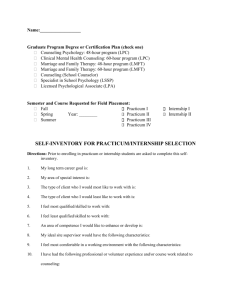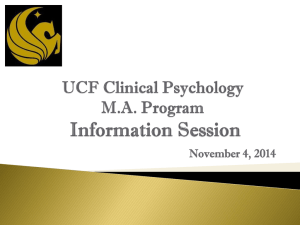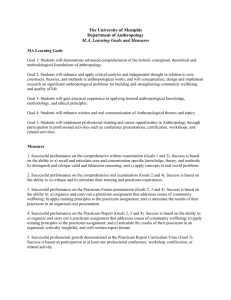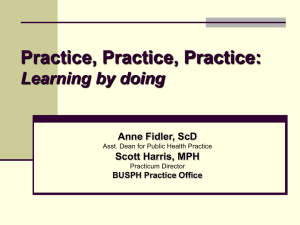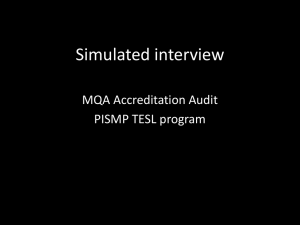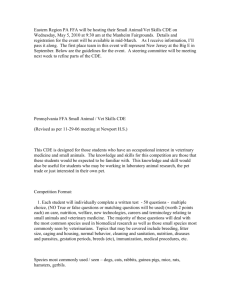Music Therapy Competencies and Coursework
advertisement
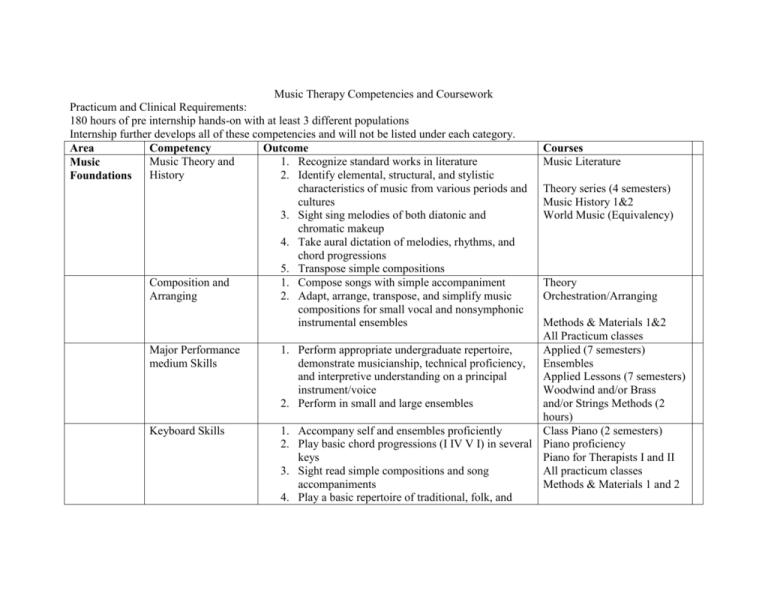
Music Therapy Competencies and Coursework Practicum and Clinical Requirements: 180 hours of pre internship hands-on with at least 3 different populations Internship further develops all of these competencies and will not be listed under each category. Area Competency Outcome Music Theory and 1. Recognize standard works in literature Music History 2. Identify elemental, structural, and stylistic Foundations characteristics of music from various periods and cultures 3. Sight sing melodies of both diatonic and chromatic makeup 4. Take aural dictation of melodies, rhythms, and chord progressions 5. Transpose simple compositions Composition and 1. Compose songs with simple accompaniment Arranging 2. Adapt, arrange, transpose, and simplify music compositions for small vocal and nonsymphonic instrumental ensembles Major Performance medium Skills 1. 2. Keyboard Skills 1. 2. 3. 4. Courses Music Literature Theory series (4 semesters) Music History 1&2 World Music (Equivalency) Theory Orchestration/Arranging Methods & Materials 1&2 All Practicum classes Perform appropriate undergraduate repertoire, Applied (7 semesters) demonstrate musicianship, technical proficiency, Ensembles and interpretive understanding on a principal Applied Lessons (7 semesters) instrument/voice Woodwind and/or Brass Perform in small and large ensembles and/or Strings Methods (2 hours) Accompany self and ensembles proficiently Class Piano (2 semesters) Play basic chord progressions (I IV V I) in several Piano proficiency keys Piano for Therapists I and II Sight read simple compositions and song All practicum classes accompaniments Methods & Materials 1 and 2 Play a basic repertoire of traditional, folk, and Guitar Skills Voice Skills Nonsymphonic Instrumental skills Improvisation Skills popular songs with or without printed music 5. Harmonize and transpose simple compositions 1. Accompany self and ensembles proficiently 2. Employ simple strumming and finger picking techniques 3. Tune guitar using standard and other tunings 4. Perform a basic repertoire of traditional, folk, and popular songs with or without printed music 5. Harmonize and transpose simple compositions in several keys 1. Lead group singing by voice 2. Communicate vocally with adequate volume 3. Sing a basic repertoire of traditional, folk, and popular songs in tune with a pleasing quality 1. Play percussion instruments alone or in ensemble 2. demonstrate basic knowledge of care and maintenance of nonsymphonic and ethnic instruments 3. Play autoharp or omnichord with same competence specified for guitar 4. Demonstrate basic understanding of technologically advanced instruments (omnichord, MIDI, electronic keyboard) 5. Demonstrate basic skills on several standard percussion instruments sufficient to facilitate rhythm based experiences for groups and individuals 1. Improvise on percussion instruments 2. Compose and develop original melodies, Guitar proficiency Guitar for Therapists All Practicum Classes Class Guitar Vocal methods Methods & Materials 1&2 All Practicum Classes Class Guitar/ Guitar For Therapists/ Piano for Therapists Percussion Methods Music and Recreation Methods & Materials 1&2 Percussion Ensemble All Practicum classes Introduction to Music Therapy Methods & Materials 1&2 Conducting Skills 3. 1. 2. Movement Skills 1. 2. Clinical Foundation accompaniments, and short pieces extemporaneously in a variety of moods and styles, vocally, and instrumentally. Improvise in small ensembles Conduct basic patterns with technical accuracy Conduct small and large vocal and instrumental ensembles Direct structured and improvisatory movement experiences Move in structural rhythmic and improvisatory manners for expressive purposes Exceptionality 1. Demonstrate basic knowledge of the potentials, limitations, and problems of exceptional individuals 2. Demonstrate basic knowledge of the causes and symptoms of major exceptionalities, and basic terminology used in diagnosis and classification 3. Demonstrate basic knowledge of typical and atypical human systems and development Principles of Therapy 1. Demonstrate basic knowledge of the dynamics and processes of a therapist-client relationship 2. Demonstrate basic knowledge of the dynamics and processes of therapy groups 3. Demonstrate basic knowledge of accepted methods of major therapeutic approaches 1. Recognize the impact of one’s own feeling, attitudes and actions on the client and the therapy Therapeutic Relationship Practicum-Clinical Improvisation class Guitar for Therapists Piano for Therapists Intro to Conducting All Practicum classes Methods and Materials 1&2 Methods & Materials 1&2 Principles with adults and Principles with children All Practicum classes All clinical Introduction to Creative Arts Therapies Introduction to Music Therapy Intro to Psychology Abnormal Psychology Electives Anatomy & Physiology MT Principles with Adults MT Principles with Children Exceptional Child All Practicum classes MT Principles and Practicum with Children MT Principles and Practicum with Adults Music and Recreation Psychology courses Advanced practicum MT Principles and Practicum Music Therapy process 2. Establish and maintain interpersonal relationships with clients that are conducive to therapy 3. Use oneself effectively in the therapist role 4. Utilize the dynamics and processes of groups 1. Demonstrate basic knowledge of existing mt methods, techniques, materials, equipment and applications 2. Demonstrate basic knowledge of principles, methods of MT assessment, and appropriate application 3. Demonstrate basic knowledge of principles and methods for evaluating the effects of music therapy 4. Demonstrate basic knowledge of purpose, intent and function of MT for various populations 5. Demonstrate basic knowledge of psychological and physiological aspects of musical behavior, influence of music on behavior, perception and cognition, music learning and development with Adults MT Principles and Practicum with Children Methods and Materials I and II Introduction to Music Therapy MT Principles and Practicum with children MT principles and Practicum with Adults Psychology of Music Elementary Classroom Methods Music and the Exceptional Child Methods & Materials 1&2 Advanced Practicum Client Assessment 1. Communicate assessment findings and recommendations in written and verbal form 2. Observe and record accurately the client’s responses to assessment 3. Identify client’s appropriate and inappropriate behaviors and needs 4. Select, design,and implement appropriate assessment tools Methods and Materials I and II MT Practicums Clinical Advanced Practicum Treatment Planning 1. Select or create MT experiences that meet the MT Practicums Foundations and Principles Therapy Implementation client’s objectives 2. Formulate goals and objectives based on assessment 3. Indentify primary needs 4. Provide preliminary estimates of frequency and duration of tx 5. Select and adapt music consistent with strengths and needs 6. Formulate MT strategies based on goal and objectives 7. Select and adapt musical instruments and equipment 8. Organize and arrange the MT setting to facilitate therapeutic involvement 9. Plan and sequence MT sessions 10. Determine client’s appropriate MT placement 11. Coordinate tx plan with other professionals 12. Demonstrate knowledge of professional standards of clinical practice 1. Recognize, interpret, and respond appropriately to significant events in sessions as they occur 2. Provide MT experiences to change nonmusical behavior 3. Provide verbal and nonverbal directions 4. Utilize singing 5. Sequence and pace MT sessions 6. Utilize therapeutic verbal skills 7. Promote group cohesiveness 8. Communicate to client expectations of behavior 9. Assist the client to communicate more effectively 10. Develop a repertoire of music for age, culture, All Clinical Music and Recreation Methods & Materials 1&2 Advanced Practicum Internship Introduction to Music Therapy Methods & Materials 1&2 MT Practicums Clinical MT Principles with Children and Adults Therapy Evaluation Documentation stylistic differences 11. Recognize and respond to effects of client’s medications 1. Revise tx plan as needed 2. Design and implement methods for evaluating and measuring client progress and effectiveness of therapeutic strategies 1. Write progress notes that accurately reflect client change and meet requirements 2. Document clinical data 3. Write in accurate, concise, objective manner 4. Communicate orally with client, tx team, families 5. Develop and use data-gathering techniques MT Practicums Clinical Methods and Materials I and II MT Practicums Clinical Termination Planning 1. Inform and prepare clients 2. Establish closure 3. Develop termination plan MT Practicums Clinical Internship Professional/Ethics 1. 2. 3. 4. 5. All MT Classes Interdisciplinary Collaboration 1. Demonstrate basic understanding of other disciplines in tx team 2. Collaborate with other disciplines Supervision and 1. Participate in and benefit from supervision Adhere to professional code of ethics Meet deadlines without prompting Resolve conflicts positively and constructively Accept criticism/feedback with willingness Demonstrate critical self-awareness MT Practicums MT Principles with Children and Adults Internship Introduction to Creative Arts Therapy Introduction to MT Administration 2. Manage and maintain MT equipment and supplies 3. Perform administrative duties required by clinicians 4. Write proposals to create and/or establish new Music Therapy Programs Research Methods 1. Interpret information in professional research literature 2. Demonstrate basic knowledge of purpose and methodology of historical, quantitative, qualitative 3. Perform a data-based literature search 4. Apply research to clinical practice Methods and Material I and II MT Practicums MT Principles with Children and Adults Clincical Advanced Practicum Psychology of Music Research in Music Therapy MT Priniciples with Children and Adults Internship



